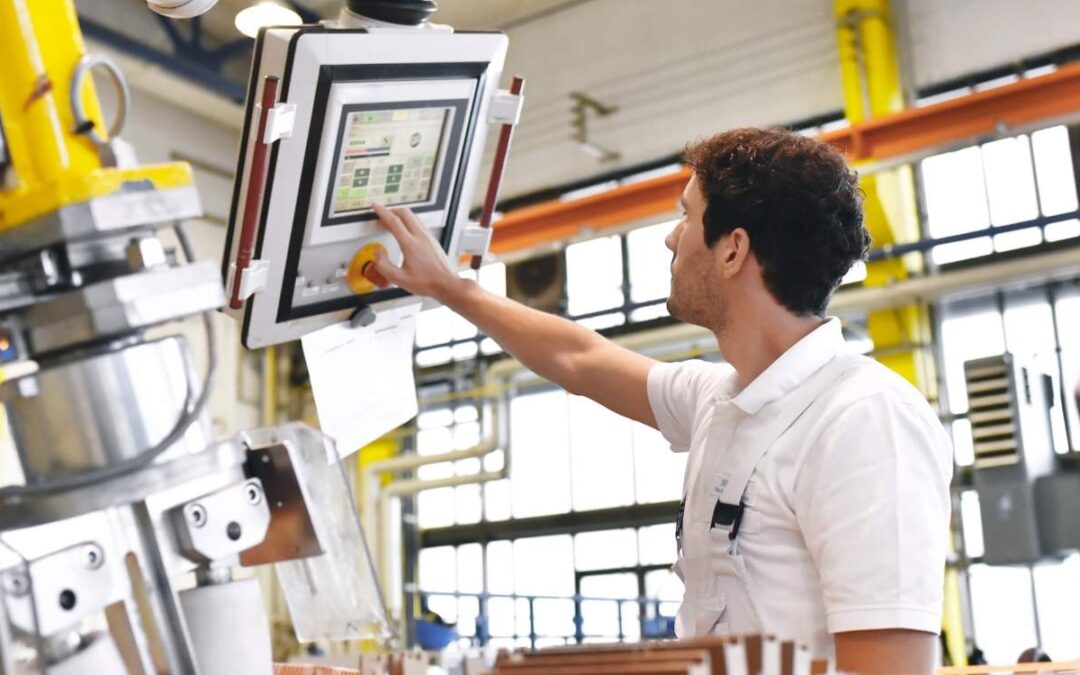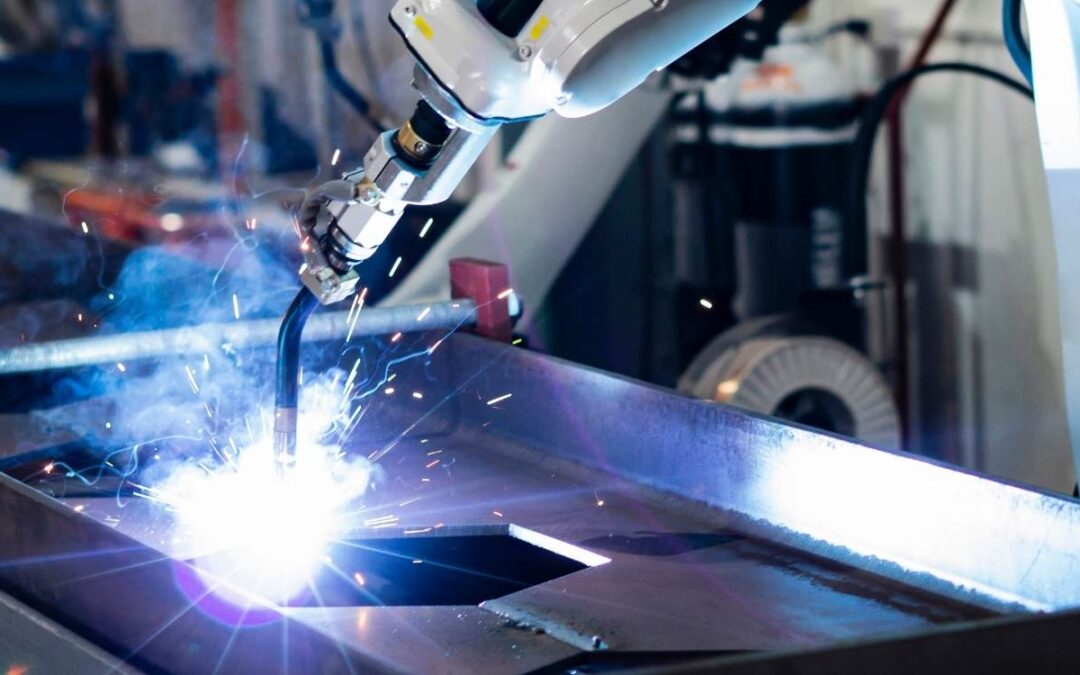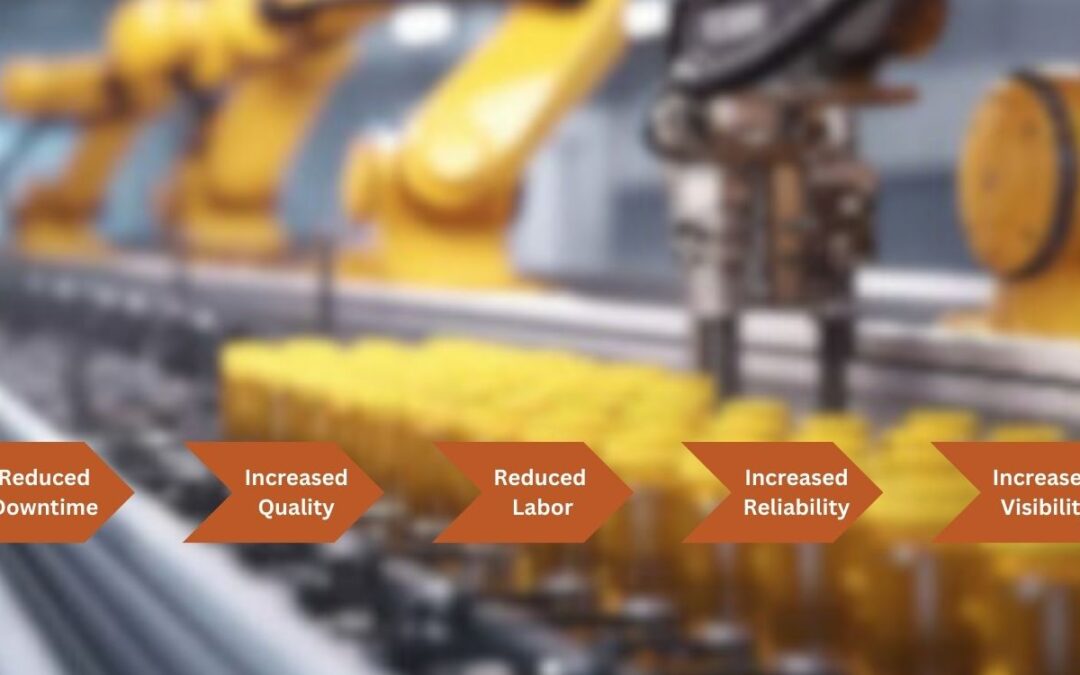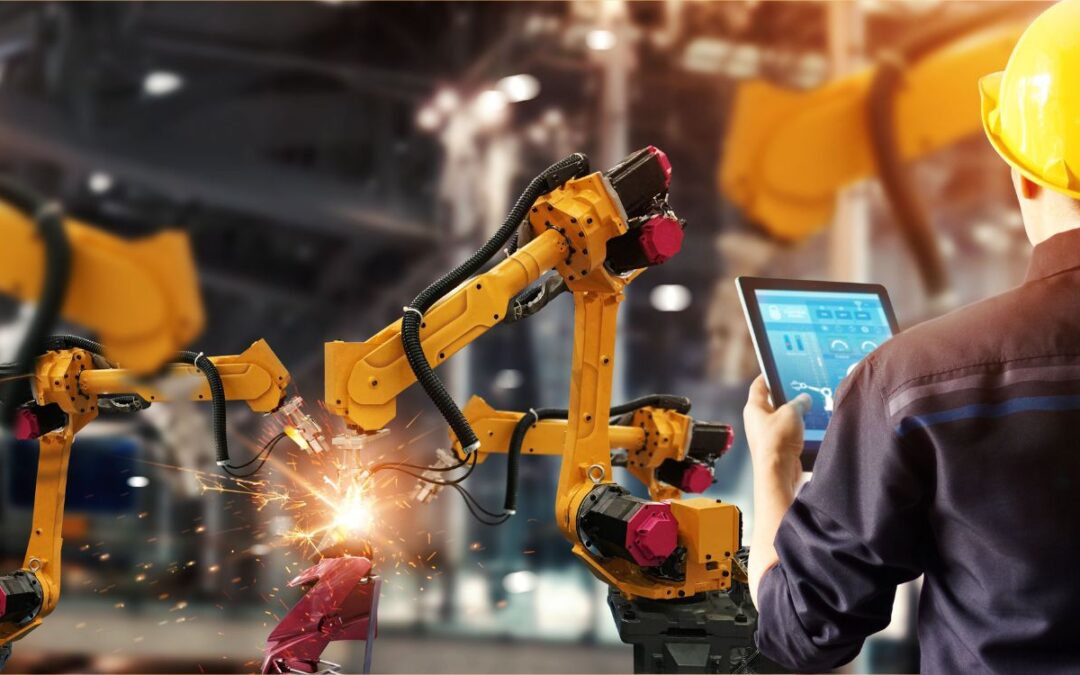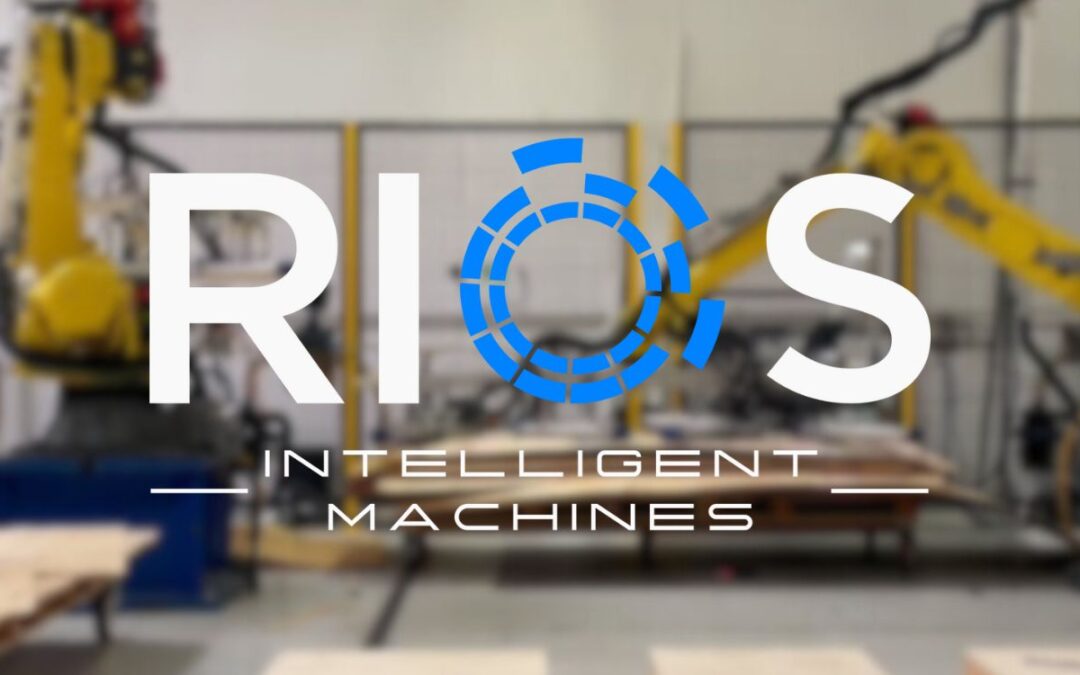
by Hunter Wylie | Nov 12, 2024 | Control Solutions
PLC (Programmable Logic Controller) programming has become a cornerstone of automated industrial processes. PLCs are widely used to automate machinery, control systems, and industrial equipment. The ability to customize a PLC system to control complex processes has revolutionized industrial automation, enabling manufacturers to improve productivity, reduce downtime, and enhance the overall efficiency of operations.
Crow Engineering specializes in PLC control systems and machine automation solutions, helping manufacturers leverage the benefits of PLC programming to optimize their production processes. By integrating PLCs into automated systems, businesses can unlock significant advantages in terms of flexibility, scalability, and precision.
What is PLC Programming?
PLC programming refers to creating a set of instructions for a Programmable Logic Controller to execute. These controllers are specialized computers that control various types of machinery by monitoring inputs, executing logical instructions, and controlling outputs. PLCs are used to automate processes, from material handling systems to complex machine automation in manufacturing plants.
The programming of a PLC typically involves using languages such as Ladder Logic, Structured Text, and Function Block Diagrams. The versatility of PLC programming allows manufacturers to automate repetitive tasks, improve safety, and adapt quickly to changes in production demands.
Key Benefits of PLC Programming in Automated Manufacturing
1. Enhanced Process Control
PLC programming allows for precise control over manufacturing processes. Automated systems can be configured to monitor inputs such as temperature, pressure, and speed, and make real-time adjustments to optimize performance.
- Real-time Adjustments: PLCs enable real-time control and decision-making based on the current state of operations. This means that if a part of the process falls outside set parameters, the PLC can instantly adjust to correct the issue.
- Customization: The flexibility of PLC programming allows for custom solutions tailored to specific needs. For example, a PLC system can be programmed to handle different materials or products, adjusting production processes to ensure high-quality outputs.
By using Crow Engineering’s PLC control systems, manufacturers can implement a system that delivers consistent quality, even in complex, multi-step processes.
2. Increased Efficiency and Productivity
One of the most significant benefits of PLC programming is the ability to increase the overall efficiency of manufacturing operations. Automated systems operate continuously with minimal manual intervention, reducing production time and ensuring consistent output.
- Faster Production Cycles: PLCs can streamline production cycles by automating repetitive tasks, resulting in faster production times and reduced bottlenecks.
- Automated Monitoring: PLC systems can be integrated with Human-Machine Interface (HMI) systems for seamless monitoring. Operators can monitor and adjust machine performance in real time, ensuring peak efficiency at all times.
Crow Engineering’s expertise in PLC control systems and HMI integration ensures that manufacturers benefit from faster production cycles and better system visibility.
3. Improved Safety
PLC programming enhances safety in industrial environments by integrating automatic safety checks and emergency protocols into the control system. By doing so, PLCs can quickly respond to unsafe conditions by halting operations or triggering safety mechanisms.
- Emergency Shutdowns: PLCs can be programmed to shut down equipment when certain parameters are breached, such as overheating or overloading, minimizing the risk of equipment damage or worker injury.
- Safety Interlocks: These are mechanisms that prevent certain machine functions from occurring if specific conditions are not met. For example, a machine may not start if a safety door is not properly closed.
Crow Engineering includes safety protocols with our machine automation solutions to ensure the highest level of workplace safety.
4. Reduced Downtime and Maintenance
One of the key advantages of PLC programming is the ability to implement predictive maintenance strategies. By continuously monitoring equipment performance, PLCs can detect anomalies that may indicate potential failures before they happen, reducing unexpected downtime.
- Predictive Maintenance: With real-time monitoring and diagnostics, PLC systems can alert operators when equipment requires maintenance, preventing sudden breakdowns and extending the life of machinery.
- Minimized Downtime: By identifying issues early, manufacturers can schedule maintenance during planned downtime, ensuring that equipment remains operational for as long as possible.
Crow offers maintenance engineering solutions that help to minimize downtime and maintain optimal equipment performance.
5. Scalability and Flexibility
PLCs provide the flexibility needed to adapt to changing production demands. As manufacturing processes evolve or new products are introduced, PLC programs can be easily modified to accommodate these changes.
- Modular Systems: PLCs can be expanded with additional modules to handle new functions or processes, making them a scalable solution for growing manufacturing operations.
- Quick Adaptability: The flexibility of PLC programming means manufacturers can quickly adjust production processes without the need for significant retooling or manual intervention.
This scalability makes PLC programming a critical component of long-term process optimization. Crow Engineering’s expertise in designing flexible PLC systems ensures that manufacturers can expand their operations with minimal disruption.
6. Cost Savings
Automating manufacturing processes with PLC programming leads to long-term cost savings by reducing labor costs, minimizing waste, and improving energy efficiency. Additionally, the predictive maintenance capabilities of PLCs help prevent costly equipment failures.
- Reduced Labor Costs: By automating manual tasks, manufacturers can reduce the need for human labor, freeing workers to focus on more strategic activities.
- Energy Efficiency: PLCs can be programmed to optimize energy usage by adjusting machine speed, temperature, and other parameters, reducing overall energy consumption.
Through the use of advanced automation technologies, Crow Engineering helps manufacturers achieve significant cost savings, improving the overall bottom line.
The benefits of PLC programming in automated manufacturing are extensive, offering improvements in efficiency, safety, precision, and cost-effectiveness. As manufacturing continues to embrace automation, PLC systems remain a critical component of modern industrial operations.
With Crow Engineering’s extensive experience in providing PLC control systems, machine automation, and process optimization, manufacturers can harness the full potential of automation to enhance their operations. Contact Crow Engineering to learn how to transform your manufacturing facility and boost operational efficiency with PLC programming solutions.

by Hunter Wylie | Nov 7, 2024 | Control Solutions
Material handling involves the movement, protection, storage, and control of materials throughout the production process in industrial and manufacturing settings. It is a crucial element of operations, ensuring the efficient flow of raw materials, components, and finished products between various stages of production. Optimizing material flow with automated industrial machinery is an important part of any plant layout design to achieve maximum process efficiency.
The Importance of Automated Industrial Machinery
Manual handling processes can introduce delays, inefficiencies, and safety risks that hinder productivity. Automating material handling systems helps resolve these challenges by leveraging technologies like conveyor systems, robotic handling, and automated guided vehicles (AGVs). These systems manage material flow more effectively, eliminating excessive manual labor, minimizing human error, and reducing production bottlenecks.
Achieving Greater Efficiency and Safety
Implementing automated material handling solutions leads to significant gains in productivity, efficiency, and safety. These systems optimize the flow of materials, leading to faster production cycles, reduced downtime, and enhanced operational continuity. As a result, manufacturers can consistently meet production targets while improving overall process efficiency. Consider the possibilities with automated industrial machinery and equipment to realize the maximum benefits of any process optimization.
Core Components of Material Handling Automation
Automated Conveyors
Automated conveyor systems are foundational to modern material handling automation, streamlining the movement of materials within production facilities. By automating material transfer, conveyors ensure a consistent and uninterrupted production flow, reducing bottlenecks and manual intervention. These systems are vital in both manufacturing and warehousing operations, where the efficient movement of goods is critical to maintaining productivity.
To optimize their function, conveyors often integrate sensors and programmable logic controllers (PLCs) that provide real-time monitoring and control. These technologies ensure smooth operation by adjusting speeds, detecting potential issues, and coordinating with other systems on the production line.
Robotic Systems
Robotic systems have become an integral part of material handling automation, offering enhanced precision and flexibility. Robots can sort, pack, and move materials with minimal human intervention, which not only increases throughput but also improves safety by taking over repetitive and hazardous tasks. In high-volume production environments, robotic systems dramatically reduce manual labor, ensuring a higher level of accuracy and consistency.
Integrating robotic systems into your operation can lead to significant workflow improvements. Crow Engineering provides advanced solutions in Machine Automation, including robotic systems and conveying solutions that adapt to specific production requirements, optimizing both efficiency and safety.
Automated Guided Vehicles (AGVs)
Automated guided vehicles (AGVs) are mobile robots designed to transport materials between production stations, warehouses, and storage areas. AGVs can follow pre-programmed routes or dynamically adjust to changing environments, making them ideal for flexible and evolving production processes.
AGVs are highly effective when integrated with existing control systems and production line layouts, ensuring seamless material flow between different areas of a facility. Crow Engineering’s expertise in Production Line Layout design ensures that AGVs function as part of an optimized system, contributing to smoother operations and greater overall efficiency.
Benefits of Automating Material Handling Systems
Increased Operational Efficiency
Automating material handling systems allows businesses to eliminate delays caused by human error, maintain accurate material movement, and ensure a smooth production flow. By automating manual processes and efficiently utilizing conveying systems, companies can optimize their operations and significantly boost productivity.
Reduction in Labor Costs
Automation reduces the need for human labor in repetitive and physically demanding tasks, leading to a significant reduction in labor costs. By automating material handling, industries like manufacturing, distribution centers, and warehousing can lower their dependence on manual labor while minimizing the risk of workplace injuries. This cost-effective solution not only enhances productivity but also fosters a safer work environment for employees.
Improved Workflow and Productivity
Automated systems improve the speed and consistency of production by eliminating bottlenecks and allowing materials to move efficiently throughout the production process. Implementing conveyor and transfer engineering is an important part of integrating cutting-edge automated systems that help streamline production lines, boost workflow, and optimize overall productivity.
Real-time Data Monitoring and Predictive Maintenance
Automated material handling systems have sensors and data collection tools that provide real-time insights into material flow and equipment performance. This allows for the proactive identification of potential issues before they become critical, enabling predictive maintenance to reduce downtime. Crow Engineering helps companies implement PLC Control Systems for continuous monitoring of automated material handling systems with capabilities for dynamic adjustments to achieve optimal performance.
Enhanced Safety
Automating material handling not only improves workflow but also enhances safety by reducing the need for human intervention, especially in hazardous environments. Built-in safety features such as emergency stops, interlocks, and obstacle detection protect workers and ensure operational safety. It is important to integrate robust safety features into automated systems to ensure full compliance with industry standards.
Customization and Integration Expertise
Crow Engineering excels in creating custom material handling automation solutions to meet each client’s specific needs. Crow engineers are skilled at integrating advanced machine automation technologies across various industries and applications. Our partnership with RIOS highlights our expertise in implementing artificial intelligence (Ai), automated, and robotic solutions. This integration maximizes output, reduces manual intervention, and enhances operational efficiency.
Crow helps clients to seamlessly integrate automated systems into existing production lines, minimizing disruptions while achieving peak efficiency. We offer industry-specific, customized solutions with automation systems designed to provide maximum ROI with flexibility and scalability for the future.
Crow Engineering specializes in delivering custom material handling automation solutions that boost operational efficiency and productivity. Our expertise in conveyor systems, Ai, robotics, and PLC solutions ensures seamless integration with existing production lines. Contact Crow Engineering today to learn how to transform your material handling processes with automated industrial machinery.

by Hunter Wylie | Oct 2, 2024 | Control Solutions
Automated industrial machinery has played a pivotal role in the evolution of the manufacturing and industrial sector, boosting production, quality, and efficiency. Automation technology has redefined how industrial operations are managed, moving from manual processes to smart, interconnected systems.
Manufacturers are benefiting from faster, more accurate, and more reliable machinery with various control solutions such as machine automation, PLC control systems, and integrating AI-powered intelligent agents. Crow Engineering specializes in helping manufacturers incorporate automated machinery into their operations, improving performance while reducing labor costs and downtime.
What is Automated Industrial Machinery?
Automated industrial machinery refers to the use of advanced machines and control systems to automate tasks that would typically require human intervention. This includes everything from assembly lines and conveyor systems to robotic arms and CNC machines. These automated systems are designed to operate independently, following a predefined set of instructions programmed into their PLC control systems.
By using automated machinery, manufacturing plants can streamline their operations, minimize errors, and increase overall productivity. Modern automation also involves real-time monitoring and data analysis, enabling manufacturers to fine-tune processes for improved performance and predictive maintenance. Crow Engineering provides custom machine automation solutions that enhance manufacturing efficiency by integrating cutting-edge control systems.
Key Improvements of Automation for Manufacturing
Increased Efficiency
Automated machinery optimizes production lines by reducing the amount of manual labor needed and speeding up repetitive tasks. Machines are capable of operating continuously with minimal downtime, leading to higher output rates and faster turnaround times.
Crow Engineering offers solutions that incorporate automated control systems such as human-machine interfaces (HMI), which allow plant operators to manage machinery remotely, adjust production speeds, and monitor performance in real-time. These integrated systems improve resource utilization, ensuring that materials and components flow seamlessly through the manufacturing process.
Cost Reduction
By automating labor-intensive processes, manufacturers can significantly reduce operational costs. Automated machinery not only reduces the number of workers needed on the factory floor but also decreases the risk of human error, which can lead to expensive production delays or defects.
Crow Engineering’s equipment configuration services include evaluating and optimizing existing machinery, allowing manufacturers to further cut costs by improving equipment functionality and reducing energy consumption.
Precision and Quality Control
Automated systems, especially those incorporating PLC control systems, provide unparalleled precision in manufacturing processes. Whether it’s controlling the temperature in a kiln or the speed of a conveyor, automation ensures that every parameter is maintained within strict tolerances.
Crow Engineering’s PLC control system solutions allow manufacturers to customize and automate complex processes, providing real-time feedback and allowing for immediate adjustments. This improves product quality and reduces waste by minimizing defects during production.
The Role of AI in Industrial Automation
The integration of artificial intelligence (AI) into automated industrial machinery takes automation to the next level. Through advanced AI algorithms, machines can now “learn” from data and adapt to new circumstances without human intervention. This capability is particularly important in industries where production conditions frequently change, such as in the lumber, cold storage, and various industrial and manufacturing sectors.
Crow Engineering, through its partnership with RIOS, provides AI-powered intelligent agents that optimize processes, improve machine learning capabilities, and automate complex tasks. These intelligent agents can be deployed in various manufacturing environments, reducing the need for manual adjustments and providing real-time insights into production performance.
With the integration of AI technologies, Crow Engineering is helping manufacturers predict machine failures, optimize resource allocation, and further reduce downtime. These intelligent systems can self-diagnose issues, recommend preventive maintenance, and continuously improve operational efficiency.
Custom Automation Solutions for Various Industries
Crow Engineering’s automation solutions are not one-size-fits-all. We custom design and engineer automation systems for a wide range of industries, including:
- Manufacturing: Automated machinery in manufacturing plants improves efficiency by managing material handling, production line processes, and quality control.
- Lumber and Forestry: Crow Engineering integrates automated systems into sawmills and wood processing plants, reducing manual labor while improving quality and output.
- Cold Storage: In temperature-sensitive environments like cold storage, automated systems ensure that processes are tightly controlled, reducing energy consumption while maintaining product integrity.
- Construction: In heavy industrial settings, automated machinery reduces the need for manual labor while increasing the speed and safety of construction processes.
The future of manufacturing lies in automated industrial machinery and the integration of advanced control systems, like those offered by Crow Engineering. By investing in machine automation, manufacturers can reduce costs, improve precision, and optimize processes for long-term efficiency. With the added capabilities of AI and intelligent agents from Crow’s partnership with RIOS, businesses can unlock new opportunities for predictive maintenance, real-time monitoring, and process optimization.
Crow Engineering provides custom automation solutions designed to optimize operations, enhance efficiency, and reduce costs across various industries. We specialize in machine automation, AI integration, and advanced PLC control systems, ensuring seamless equipment operation and performance. Contact us today to speak with an engineer about elevating your facility’s performance with custom automated industrial machinery.

by Hunter Wylie | Sep 26, 2024 | Control Solutions
Machine automation has revolutionized industrial operations, driving efficiency, improving safety, and enhancing product quality across sectors. By automating repetitive tasks and optimizing complex processes, businesses are better equipped to meet the growing demands of modern manufacturing.
At Crow Engineering, we specialize in designing and implementing advanced machine automation solutions customized for various industries such as manufacturing, forestry, construction, and cold storage.
The Benefits of Machine Automation in Manufacturing
Increased Productivity
Automation systems, such as robotics and programmable logic controllers (PLCs), allow manufacturers to operate continuously, drastically improving production output. Automated machines can run without breaks, maintaining a steady workflow and reducing downtime. Crow Engineering’s expertise in machine automation ensures that production lines are optimized for maximum efficiency, minimizing human intervention and enhancing speed.
Improved Product Quality
Automation reduces the variability caused by human error, leading to more consistent product quality. In industries like manufacturing and lumber processing, this is especially crucial where precision and uniformity are vital. By integrating PLC control systems and Human-Machine Interfaces (HMIs), Crow Engineering provides solutions that deliver precise control over automated processes, resulting in consistent production quality.
Energy and Cost Efficiency
While automation systems may require significant initial investment, they provide long-term cost savings by reducing labor costs and minimizing errors. Automated processes are also energy-efficient, as they can be programmed to operate only when needed, reducing energy consumption. Crow Engineering designs machine automation systems that help businesses achieve both cost and energy savings by optimizing machine operations.
Enhanced Workplace Safety
One of the key advantages of automation is its ability to perform tasks that are hazardous to humans. By reducing the need for manual labor in dangerous environments, such as sawmills or construction sites, automation improves worker safety. Features such as emergency stops, safety interlocks, and real-time monitoring through HMIs help ensure that safety protocols are always followed. Crow Engineering’s HMI systems provide operators with the tools they need to control machinery safely and effectively.
Key Technologies in Machine Automation
PLCs are essential for automating and controlling manufacturing processes. They offer precise control over machinery, making them crucial in optimizing industrial systems. At Crow Engineering, we integrate PLCs into manufacturing and industrial environments to streamline operations, providing real-time data for better process management. Our PLC control systems offer clients-centered solutions that fit their unique operational needs.
HMIs serve as the bridge between operators and automated systems. By providing real-time data visualization and control, HMIs allow operators to monitor system performance and make informed decisions. Crow Engineering offers custom HMI systems that are designed to improve the ease of operation and enhance productivity in sectors like manufacturing, construction, and forestry.
Robotic systems, when combined with artificial intelligence, bring a new level of flexibility and adaptability to manufacturing operations. These systems can perform complex tasks without human intervention, optimizing workflows and reducing the margin of error. Crow Engineering’s partnership with RIOS allows us to integrate AI-driven robotics into our machine automation services, providing clients with cutting-edge automation solutions.
Applications of Machine Automation in Key Industries
Lumber and Forestry
In the lumber and forestry industry, machine automation improves the efficiency of sawmill operations and material handling processes. Automated systems reduce the need for manual labor, making the workflow faster and safer. Crow Engineering designs automation solutions specifically for sawmills, optimizing productivity while reducing operational risks.
Manufacturing
For manufacturing operations, automation is crucial in reducing downtime, improving product consistency, and optimizing material handling. Our automated systems offer real-time monitoring and control, allowing businesses to streamline production and reduce waste. Crow Engineering’s machine automation solutions are customized to meet your production demands, ensuring reliable and consistent output.
Automation plays an essential role in modern construction by optimizing the operation of heavy machinery and improving project timelines. Automated systems, paired with integrated control solutions, enhance safety and operational efficiency on construction sites.
Cold Storage
In cold storage environments, automation ensures precise temperature control, reduces energy consumption, and optimizes inventory management. Crow Engineering’s custom automation systems help cold storage facilities maintain product integrity while reducing operational costs through efficient resource management.
Why Choose Crow Engineering for Machine Automation?
At Crow Engineering, we understand the unique needs of industries looking to enhance their operations through automation. With a team of experienced engineers licensed throughout the United States, we offer a diverse range of engineering certifications and value-added services.
Our solutions integrate the latest technologies in PLC control systems, HMIs, and machine automation, helping clients improve operational efficiency, reduce costs, and enhance safety.
Machine automation is shaping the future of modern manufacturing, providing businesses with the tools they need to stay competitive in an increasingly automated world. Whether in lumber processing, manufacturing, or cold storage, Crow Engineering’s expertise in automation can help your business achieve greater efficiency, safety, and profitability.Contact us today to learn more about how our machine automation solutions can transform your operations.

by Hunter Wylie | Sep 19, 2024 | Control Solutions
The need for smarter, more adaptive systems is greater than ever as technology evolves in every industry. Crow Engineering has long been at the forefront of delivering innovative automation solutions, and our partnership with RIOS brings a cutting-edge layer to our offerings—intelligent agents. These agents are transforming industrial operations, enabling seamless communication between machines, systems, and human operators, all while optimizing performance.
Crow Engineering offers intelligent agent AI solutions including comprehensive automation systems that benefit industries such as manufacturing, lumber and forestry, construction, and cold storage.
What are Intelligent Agents in Industrial Automation?
Intelligent agents are AI-powered systems that monitor and optimize industrial processes by making autonomous decisions based on real-time data. These agents can predict machine behavior, adapt to changing conditions, and provide operators with actionable insights, all while ensuring that the system continues to run smoothly.
Crow and RioS: Artificial Intelligence (AI) and Machine Learning Solutions
At Crow Engineering, we integrate intelligent agents to improve machine automation, optimize process workflows, and enhance decision-making in complex industrial environments. By leveraging our expertise and RIOS’ cutting-edge technology, we help industries move beyond traditional automation systems to smarter, more flexible operations. Learn more about RIOS intelligent agents and contact Crow Engineering with any questions.
Applications of Intelligent Agents and Crow Engineering Solutions
At Crow Engineering, we specialize in advanced machine automation solutions including intelligent agents and seamless integration. These agents enhance automated systems by continuously monitoring machine performance, allowing real-time adjustments to processes like material handling and production. Intelligent agents can significantly reduce the need for manual intervention, thus optimizing machine uptime and reducing energy consumption.
In industries where human operators still play a critical role in controlling machinery, HMI systems are key. Intelligent agents complement HMI systems by providing real-time data visualization and decision-making support, empowering operators with valuable insights for better process control and faster response times. This integration leads to smoother, more efficient workflows, as well as improved safety for the workforce.
In complex industrial settings, integrated control systems require cohesive management of various machines and processes. Intelligent agents enhance these systems by coordinating multiple operations, enabling machines to communicate and adjust to each other’s performance. This coordination reduces bottlenecks, streamlines workflows, and improves overall system efficiency.
Programmable Logic Controllers (PLCs) are the backbone of many automated systems, controlling everything from simple machinery to complex industrial processes. Intelligent agents bring an added layer of intelligence to PLC systems by predicting maintenance needs, adjusting processes based on real-time data, and providing fault detection. This results in less downtime and better control over production environments.
Benefits of Implementing Intelligent Agents with Crow Engineering and RIOS
1. Increased Efficiency
By automating real-time decision-making and reducing manual oversight, intelligent agents drastically improve the efficiency of operations. They dynamically adjust systems to changing demands, optimizing resource usage and cutting operational costs.
2. Predictive Maintenance
One of the key advantages of intelligent agents is their ability to anticipate equipment issues before they lead to costly downtime. By monitoring machine performance and using data analytics to predict failures, intelligent agents help reduce unscheduled maintenance and prolong the lifespan of machinery.
3. Enhanced Flexibility
Traditional automation systems can be rigid and slow to adapt to changes. In contrast, intelligent agents can quickly adapt to new information, making your operations more resilient and flexible. This flexibility is critical in industries that experience fluctuating demands or where rapid shifts in production are needed.
4. Cost Savings
With improved efficiency, predictive maintenance, and smarter automation, businesses can realize significant long-term cost savings. Reduced energy consumption, fewer breakdowns, and optimized production processes lead to a lower total cost of ownership and faster return on investment.
Industries Served by Crow Engineering and Intelligent Agents
Manufacturing
Manufacturers benefit from enhanced automation and data-driven processes, allowing for greater productivity, reduced waste, and more efficient use of resources.
Food and Beverage
In highly regulated industries like food and beverage, intelligent agents ensure compliance with safety standards, maintain consistent product quality, and improve process optimization.
Lumber and Forestry
Lumber and forestry industries rely on intelligent agents for precise machine control, improving productivity and reducing energy consumption in material handling and sawmill operations.
Utilities and Energy
Intelligent agents streamline energy management, optimizing the performance of pumps, compressors, and other critical infrastructure, leading to more efficient production and distribution.
Why Choose Crow Engineering for Intelligent Agent Solutions?
Expertise in Custom Solutions
With decades of experience, Crow Engineering excels in integrating intelligent agents with existing systems to create custom solutions that meet the unique needs of our clients. Whether you need automation, PLC systems, or advanced control integration, our team can design systems to fit your operational requirements.
Partnership with RIOS
Our collaboration with RIOS provides our clients with access to state-of-the-art intelligent agent technology, ensuring that your industrial systems are at the forefront of innovation.
Full-Service Solutions
From concept to implementation, Crow Engineering offers a comprehensive suite of services, including process optimization, machine automation, and integrated control systems. We provide ongoing support to ensure your systems continue to operate at peak efficiency.
Incorporating intelligent agents into industrial automation systems is no longer a futuristic vision—it’s happening now, and it’s transforming the way industries operate.
Crow Engineering’s partnership with RIOS enables us to deliver advanced, intelligent automation solutions that optimize efficiency, reduce costs, and enhance decision-making. Whether you’re looking to upgrade existing systems or implement entirely new ones, Crow Engineering is your trusted partner. Contact us today to learn more about how intelligent agents can revolutionize your operations and drive your business forward.
